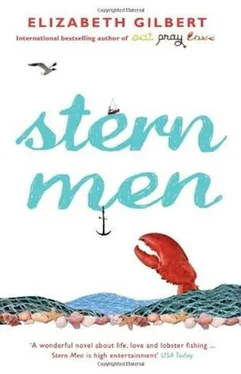“Much appreciated,” Stan said. “Thanks for coming by.”
“Sure enough,” said the pastor, and headed down to the boat so that he could get off the island before dark; there was never any decent lodging for him on Fort Niles, and he wasn’t about to stay overnight on that inhospitable rock.
It was the least ostentatious wedding in the history of the Ellis family. If, that is, Mary Smith-Ellis could be considered a member of the Ellis family, a matter now seriously in question.
“As your aunt,” Miss Vera had told Mary, “I must tell you that I think marriage would be a mistake for you. I think it a big mistake for you to handcuff yourself to this fisherman and to this island.”
“But you love this island,” Mary had said.
“Not in February, darling.”
“But I could visit you in February.”
“Darling, you’ll have a husband to look after, and there will be no time for visiting. I had a husband once myself, and I know. It was most restrictive, ” she declared, although it had not in the least been restrictive.
To the surprise of many, Miss Vera did not put up further argument against Mary’s wedding plans. For those who had witnessed Vera’s violent outrage over Mary’s mother’s pregnancy thirty years earlier, and her tantrums at Mary’s mother’s death twenty-nine years earlier (not to mention her daily bouts of temper over sundry insignificant matters), this calm in the face of Mary’s news was a mystery. How could Vera stand for this? How could she lose another helpmate? How could she tolerate this disloyalty, this abandonment?
Perhaps nobody was more surprised by this reaction than Mary herself, who had lost ten pounds over the course of that summer from anxiety about Stan Thomas. What to do about Stan Thomas? He was not pressing her to see him, he was not taking her away from her responsibilities, but he persistently insisted that they would marry by the end of the summer. He’d been saying so since June. There did not seem to be room for negotiation.
“You think it’s a good idea, too,” he reminded her, and she did think so. She did like the idea of marrying. It wasn’t something she had thought about much before, but now it seemed exactly right. And he was so handsome. And he was so confident.
“We’re not getting any younger,” he reminded her, and indeed they were not.
Still, Mary vomited twice on the day she had to tell Miss Vera she was to marry Stan Thomas. She couldn’t put it off any longer and finally broke the news in the middle of July. But the conversation, surprisingly, was not difficult at all. Vera did not become enraged, although she had frequently become enraged over much smaller issues. Vera made her “this is a big mistake” statement as a concerned aunt, and then resigned herself to the idea entirely, leaving Mary to ask all the panicky questions.
“What will you do without me?” she asked.
“Mary, you sweet, sweet girl. Don’t let it cross your mind.” This was accompanied by a warm smile, a pat on the hand.
“But what will I do? I’ve never been away from you!”
“You are a lovely, capable young woman. You’ll be fine without me.”
“But you don’t think I should do this, do you?”
“Oh, Mary. What does it matter what I think?”
“You think he’ll be a bad husband.”
“I have never spoken a word against him.”
“But you don’t like him.”
“You’re the one who has to like him, Mary.”
“You think I’ll end up poor and alone.”
“Oh, you never will, Mary. You’ll always have a roof over your head. You’ll never end up selling matches in the city or something dreadful like that.”
“You think I won’t make friends here on the island. You think I’ll be lonely, and you think I’ll go crazy in the winter.”
“Who wouldn’t make friends with you?”
“You think I’m loose, running around with a fisherman. You think I’m turning out to be like my mother.”
“The things I think!” Miss Vera said, and laughed.
“I will be happy with Stan,” Mary said. “I will. ”
“Then I couldn’t be happier for you. A happy bride is a radiant bride.”
“But where should we get married?”
“At a church of God, I dearly hope.”
Mary fell silent, as did Miss Vera. It was a tradition for Ellis brides to marry in the gardens of Ellis House, attended by the Episcopal Bishop of Concord, boated in for the occasion. Ellis brides had lavish weddings, witnessed by every available member of the Ellis family and by all the family’s dearest friends. Ellis brides had elegant receptions at Ellis House. So when Miss Vera Ellis suggested a marriage at an unnamed “church of God,” Mary had reason to be silent.
“But I want to get married here, at Ellis House.”
“Oh, Mary. You don’t want that headache. You should have a simple ceremony and get it over with.”
“But will you be there?” Mary asked, after a long while.
“Oh, darling.”
“Will you?”
“I would only cry and cry, darling, and spoil your special day.”
Later that afternoon, Mr. Lanford Ellis-Vera’s older brother and the reigning patriarch of the family-called Mary Smith-Ellis to his room to congratulate her on her forthcoming marriage. He expressed his hope that Stan Thomas was an honorable young man. He said, “You should buy yourself a pretty wedding gown,” and he passed her an envelope. She picked at the flap, and he said, “Don’t open it here.” He gave her a kiss. He gave her a squeeze on the hand and said, “We have always had the fondest feelings for you.” And he did not say more.
Mary didn’t open the envelope until she was alone in her room that evening. She counted out a thousand dollars in cash. Ten hundred-dollar bills, which she slipped under her pillow. That was a great deal of money for a wedding gown in 1956, but, in the end, Mary was married in a flowered cotton dress that she had sewn for herself two summers earlier. She didn’t want to spend the money. Instead, she decided to hand the envelope and its contents to Stan Thomas.
That money was what she brought to the marriage, along with her clothing and the sheets from her bed. These were all her possessions, after decades of service to the Ellis family.
In the Ellis mansion in Concord, Ruth Thomas’s mother showed her to her room. They had not seen each other for some time. Ruth didn’t like to visit Concord and rarely did. There had been some Christmases, in fact, when Ruth had elected to stay in her room at boarding school. She liked that more than being in Concord and the Ellis mansion. Last Christmas, for instance.
“You look wonderful, Ruth,” her mother said.
“Thank you. You look good, too.”
“Don’t you have any bags?”
“No. Not this time.”
“We put up new wallpaper for you.”
“It looks nice.”
“And here’s a picture of you when you were a little girl.”
“Look at that,” Ruth said, and leaned toward the framed photograph hanging on the wall next to the dresser. “That’s me?”
“That’s you.”
“What do I have in my hands?”
“Pebbles. Pebbles from the Ellises’ driveway.”
“Boy, look at those fists!”
“And there I am,” Ruth’s mother said.
“There you are.”
“I’m trying to get you to hand me the pebbles.”
“It doesn’t look as if you’re going to get them.”
“No, it doesn’t. I’ll bet I didn’t get them.”
“How old was I?”
“About two. So adorable.”
“And how old were you?”
“Oh. Thirty-three or so.”
“I never saw that picture before.”
“No, I don’t think you have.”
“I wonder who took it.”
“Miss Vera took it.”
Читать дальше









